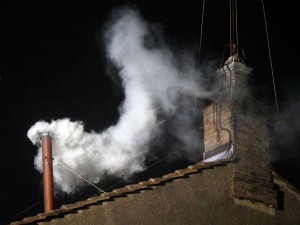In case you missed it, the Roman Catholic Church has a new leader as of this week. Pope Francis is the first pontiff from the Americas, and he has been received with great joy. From this, there is a lesson for us.
Our Roman Catholic friends are a devoted bunch. The vigils that took place outside the Vatican as people awaited the white smoke billowing from the  chimney of the Sistine Chapel brought people for as far as the eye could see. And once that white smoke came, there was jubilation – even before they knew the identity of the new pope. Folks were excited to know that their church had a new leader.
chimney of the Sistine Chapel brought people for as far as the eye could see. And once that white smoke came, there was jubilation – even before they knew the identity of the new pope. Folks were excited to know that their church had a new leader.
What makes this all the more amazing, from a democratic perspective, is that these folks are showing so much joy at the election of a leader over whom they had no say whatsoever. And I’m not saying that’s a bad thing.
The lesson for us, I think, is multifold. First, trust the process. There is very little that’s democratic about the Roman Catholic Church; it doesn’t pretend otherwise. It’s a top-down system of church government, and the major decisions are made by high-ranking clergy. The decision over who would be made pope was made by 115 men (cardinals) who themselves have been papal appointees over the years. And their decision-making process was one that, they trusted, was guided by the Holy Spirit. Of course, we don’t know what went on in the conclave; but if 115 cardinals can decide, reasonably quickly, that one of their number should become the next pope, there must be something to be said for the process.
Second, trust the deciders. There were people in St. Michael’s Cathedral in Toronto who prayed for their pastor, Cardinal Thomas Collins, every day from the time he left for Rome, that his decision, and that of the other cardinals, would be Spirit-led. And once the decision was proclaimed, no one doubted the sanity or opinion of these decision makers. They accepted it with joy.
Third, support the leader. Because the people trusted the process and trusted the deciders, it became easy to support the leader. True, there may be those who had been hoping, maybe even praying, that someone else would be elected. But nobody is jumping up and down, making a fuss over the election of a new pope. They are rejoicing with the decision that was made, and celebrating with their fellow Roman Catholics that the Lord has guided the process of choosing a new leader.
What does this mean for us? It can apply in our politics, and in our churches.
In our politics, the lesson is that once a leader is chosen, through whatever democratic process we have, we support the leader…even if that person’s politics are not the same as ours. Of course, there is always room for opposition, but it is always, in Canadian parlance, loyal opposition. (Granted, that loyalty, in context, is to the Crown, but as the one who leads on the Crown’s behalf, there is an implied loyalty that comes even amid asking difficult questions.) Too often, at least in North American politics, the opposition (both official and unofficial) has become cruel and personal in recent years. This is not helpful to the cause of governance, nor to the cause of the Gospel that we followers of Jesus seek to live out. Once the leader is chosen, be supportive.
(I know, I know. Hitler was duly elected. But can we call a spade a spade and say that the situation surrounding the Third Reich was an exception rather than normative?)
In our churches, the lesson is that once a leader is chosen, through whatever democratic process we have, we support the leader. Sound familiar? The same concept applies. In my tribe, The Presbyterian Church in Canada, the congregation is asked the following question at the induction of a new pastor: “Do you receive N to be your minister as from Christ?” That’s a pretty serious question. If we believe that our leader has been chosen through a divinely anointed process, and that the Lord Jesus is personally bringing this person into our midst as a leader, it stands to reason that we should support him or her – even when we have disagreements with that leader. That applies to your elders and deacons, too.
This doesn’t mean we can’t air our grievances; what it does mean is that we air our grievances respectfully. In Christian circles, that means following the principles that Jesus set out for us, particularly in Matthew 18.15-17: “If your brother or sister sins, go and point out their fault, just between the two of you. If they listen to you, you have won them over. But if they will not listen, take one or two others along, so that ‘every matter may be established by the testimony of two or three witnesses.’ If they still refuse to listen, tell it to the church; and if they refuse to listen even to the church, treat them as you would a pagan or a tax collector” (NIV).
The unity of the church for which Jesus prayed (and still prays) will become more real the more we joyfully and prayerfully support our church leaders. I’m blessed to serve a congregation that offers joyful and prayerful support to its leaders, and I hope you do, too.

